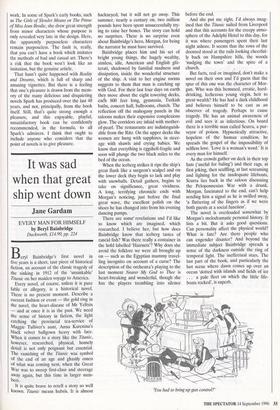It was sad when that great ship went down
Jane Gardam
EVERY MAN FOR HIMSELF by Beryl Bainbridge Duckworth, f14.99, pp. 224
Beryl Bainbridge's first novel in five years is a short, taut piece of historical fiction, an account of the classic tragedy of the sinking in 1912 of the 'unsinkable' Titanic on her maiden voyage to America. Every novel, of course, unless it is pure fable or allegory, is a historical novel. There is no present moment. Describe a current fashion or event — the gold ring in the navel, the heart-disease of Mr Yeltsin — and at once it is in the past. We need the sense of history in fiction, the light catching the provincial tea-service of Maggie Tulliver's aunt, Anna Karenina's black velvet ballgown heavy with lace. When it comes to a story like the Manic, however, researched, physical, homely detail is not only poignant but essential. The vanishing of the Titanic was symbol of the end of an age and ghastly omen of what was coming next, when the Great War was to sweep first-class and steerage away again, but this time in larger num- bers.
It is quite brave to retell a story so well known. Titanic means hubris. It is almost hackneyed, but it will not go away. This summer, nearly a century on, two million pounds have been spent unsuccessfully try- ing to raise her bones. The story can hold no surprises. There is no surprise even about Bainbridge's hero, Morgan, for being the narrator he must have survived.
Bainbridge places him and his set of bright young things, the hugely wealthy, aimless, idle, American and English &li- terati, shadowed by familial madness and dissipation, inside the wonderful structure of the ship. A visit to her engine rooms suggests to them that man is catching up with God. For their last four days on earth they move about the eight towering decks, eaCh 800 feet long, gymnasia, Turkish baths, concert hall, ballrooms, church. The reflection off the mahogany panels in the saloons makes their expensive complexions glow. The corridors are inlaid with mother- of-pearl. The restaurants are indistinguish- able from the Ritz. On the upper decks the women are hung with sapphires, in steer- age with shawls and crying babies. We know that everything is eggshell-fragile and soon will plunge the two black miles to the bed of the ocean.
When the iceberg strikes it rips the ship's great flank like a surgeon's scalpel and on the lower deck they begin to lark and play with snowballs. Detail gathers, begins to take on significance, great vividness. A long, terrifying chronicle ends with Morgan's noticing, just before the final great wave, the excellent polish on the shoes he has changed into from his evening dancing pumps.
There are some* revelations and I'd like to know which are imagined, which researched. I believe her, but how does Bainbridge know that iceberg tastes of rancid fish? Was there really a container in the hold labelled 'Hairnets'? Why does she avoid the folklore we were all brought up on — such as the Egyptian mummy travel- ling incognito on account of a curse? The description of the orchestra's playing to the last moment Nearer My God to Thee is heart-breaking and wonderful, though she has the players trembling into silence before the end.
And she put me right. I'd always imag- ined that the Titanic sailed from Liverpool and that this accounts for the creepy atmo- sphere of the Adelphi Hotel to this day, for it was where passengers spent their last night ashore. It seems that the rows of the doomed stood at the rails looking cheerful- ly back on Hampshire hills, the woods 'nudging the town' and the spire of a church.
But facts, real or imagined, don't make a novel on their own and I'd guess that the spur of this one was the character of Mor- gan. Who was this bemused, erratic, hard- drinking, lecherous young virgin, heir to great wealth? He has had a dark childhood and believes himself to be cast as an observer of tragedy. Perhaps to cause tragedy. He has an animal awareness of evil and sees it as infectious. On board there is a terrible man called Scurra, a pur- veyor of poison. Hypnotically attractive, hopeless of the human condition, he spreads the gospel of the impossibility of selfless love. 'Love is a woman's word.' It is every man for himself.
As the crowds gather on deck in their top hats ('useful for baling') and their rags, at first joking, then scuffling, at last screaming and fighting for the inadequate lifeboats, Scurra lies back in the saloon discussing the Peloponnesian War with a drunk. Morgan, fascinated to the end, can't help sending him a signal as he is swilled away, 'a fluttering of the fingers as if we were both guests at a social function'.
The novel, is overloaded somewhat by Morgan's melodramatic personal history. If lists a bit. But it asks good questions. Can personality affect the physical world? What is fate? Are there people who can engender disaster? And beyond the immediate subject Bainbridge spreads a sense of the darkness outside the ring of temporal light. The ineffectual stars. The last part of the book, and particularly the last scene where dawn comes up over an ocean 'dotted with islands and fields of ice . . . a pale fleet on which the little life- boats rocked', is superb.
You had to bring up gun control?'


































































 Previous page
Previous page